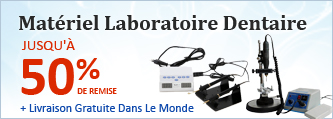- Accueil
- service.zetadental.fr@gmail.com
-
- E-mail : service.zetadental.fr@gmail.com
- Aide Directe
- Favori
- Panier:(0)
- Aide
fr.ishinerdental.com, le plus grand fournisseur en ligne du matériel dentaire pour tous les pays et toutes les régions .
- Votre position:
- Articles
- Nouvelles Dentaires
- Conflicts of interests in dental research
Conflicts of interests in dental research
Researchers are more likely to report positive results about dental treatments if they get paid by the companies marketing the treatments, a new study suggests.
In an analysis of 135 randomized clinical trials from leading dental journals, those in which the authors had a conflict of interest were 2.4 times more likely to have positive results, the study shows.
Researchers from Chile and Canada reported the results at the International Association for Dental Research (IADR) 91st General Session and Exhibition in Seattle, Washington.
University of Toronto researcher Romina Brignardello-Petersen, DDS, told Medscape Medical News she was not surprised by the results.
"It has already been observed in medicine," she said. "In some dental specialties there is a lot of potential financial gain."
A Difficult Problem
Dr. Brignardello-Petersen and her colleagues began by identifying the 10 dental journals with the greatest 2011 impact factors as rated by Journal Citation Reports (Science Edition).
Only 7 of these had published a randomized clinical trial in the past year, so the researchers narrowed their study to these: Clinical Implant Dentistry and Related Research, Journal of Dental Research, Dental Materials, Journal of Clinical Periodontology, Journal of Dentistry, Journal of Endodontics, and Oral Oncology.
They then identified 135 randomized clinical trials reported in these journals and looked at which authors had a conflict of interest.
They defined a conflict of interest by broad criteria as one in which an author had any type of financial relationship with a company that was being evaluated, including funding to pay for the trial, funding for the author to present the results, and other types of grant.
They defined a conflict of interest by narrow criteria as a more direct financial relationship, such as an author who is an employee, paid consultant, or stockholder of the company being evaluated.
Dr. Brignardello-Petersen acknowledged that some researchers have other kinds of conflicts of interest, such as a personal stake in the outcome, but she and her colleagues could not measure this in their study.
They found that authors in 37.78% of the studies had broad conflicts, and authors in 30% of the trials had a conflict by narrow criteria.
Overall, 57.78% of the trials had positive results.
The 2.4-fold increased likelihood of a positive result in which there was a conflict of interest by broad criteria was statistically significant, with 95% confidence that the likelihood was between 1.5 and 5.02 times higher.
They found that authors who had a conflict of interest using the narrow criteria were 12.25 times more likely to report a positive result (95% confidence interval, 1.56 - 96.11).
But the problem is a difficult one to address, said Dr. Brignardello-Petersen.
"I think that unfortunately, it would be very hard to conduct clinical research if there was no sponsorship," she said. "Randomized clinical trials are expensive to conduct, and researchers have a bigger opportunity to conduct research if they work with one of the companies."
Government funding is meager in dentistry because most oral diseases are not immediately life-threatening.
Dental journals typically ask researchers to disclose conflicts of interest. "Besides being transparent about conflicts of interest and about the way the research was done, the rest is up to the reader," Dr. Brignardello-Petersen said.
But many readers do not know how to assess the evidence critically, she said. "To be completely honest, probably it does have a big impact because most people who use the literature are not accustomed to doing critical analysis of it."
On the other hand, Marjorie Jeffcoat, DMD, a former editor-in-chief of the Journal of the American Dental Association and past president of IADR, told Medscape Medical News that she is confident existing safeguards will keep the dental literature from being distorted.
For example, when she worked at the Journal of the American Dental Association, the editors asked researchers not only whether they had a conflict of interest but also how they would manage the conflict.
"Most of the research comes out of industry," said Dr. Jeffcoat, who was not involved in this study. "That's who does it."
Neither Dr. Jeffcoat nor Dr. Brignardello-Petersen have disclosed any relevant financial relationships.
International Association for Dental Research (IADR) 91st General Session and Exhibition. Abstract 1784. Presented March 22, 2013.
Source: medscape.com
Tous Nos Produits
- Cire
-
- Brûleur à cire (1)
- Réchauffeur de cire (5)
- Couteau à cire (2)
- Équipement médical
-
- oxymètre de pouls (9)
- Moniteur ECG (4)
- Moniteur patient (10)
- Laboratoire
-
- Unité dentaire mobile (4)
- Machine à souder (3)
- MOTEUR D'IMPLANTOLOGIE (2)
- Malaxeur dentaire (3)
- Articulateur dentaire (4)
- Amalgamateur dentaire (6)
- Bec à gaz (2)
- Centrifugateur (1)
- Compresseur & Découpeur (2)
- Perceur dentaire (2)
- loupes dentaires (2)
- Machine à former (2)
- Vibrateur & Paralléliseur (4)
- Instruments rotatifs
-
- Turbine (48)
- Contre Angle (12)
- Instrument à LED (11)
- Moteur d'air (5)
- Pièce à main (5)
- Kit des instruments rotatifs (20)
- Rotor Dentaire (27)
- Fraises dentaires (16)
- D'autres Accessoires (6)
- Lampe à photopolymériser
-
- Lampe Halogène (2)
- Sans fil (31)
- Filaire (6)
- Filaire et sans fil (0)
- Double couleur lumière (0)
- Radiomètre intégré (0)
- Pour fauteuil dentaire (1)
- Guide Optique (2)
- Lunettes de Protection (1)
- D'autres
-
- Brosse à dents électrique (10)
- machine à polir (1)
- tondeuse (2)
- Série Pen (7)
- Service En Ligne
- Paiement
- Contactez-nous
- Entretien & Maintenance
- Guide de lubrification des pièces à main
- L’entretien de votre autoclave
- Autoclave Procedure For Dental High Speed Handpiece
- Infos Site
- Politique de confidentialité sur fr.ishinerdental.com
- Pourquoi choisir fr.ishinerdental.com
- A propos de nous

Service de Newsletter
S'abonner à notre newsletter pour être bien informé des bonnes affaires, des nouveautés et d'autres exclusivities…













